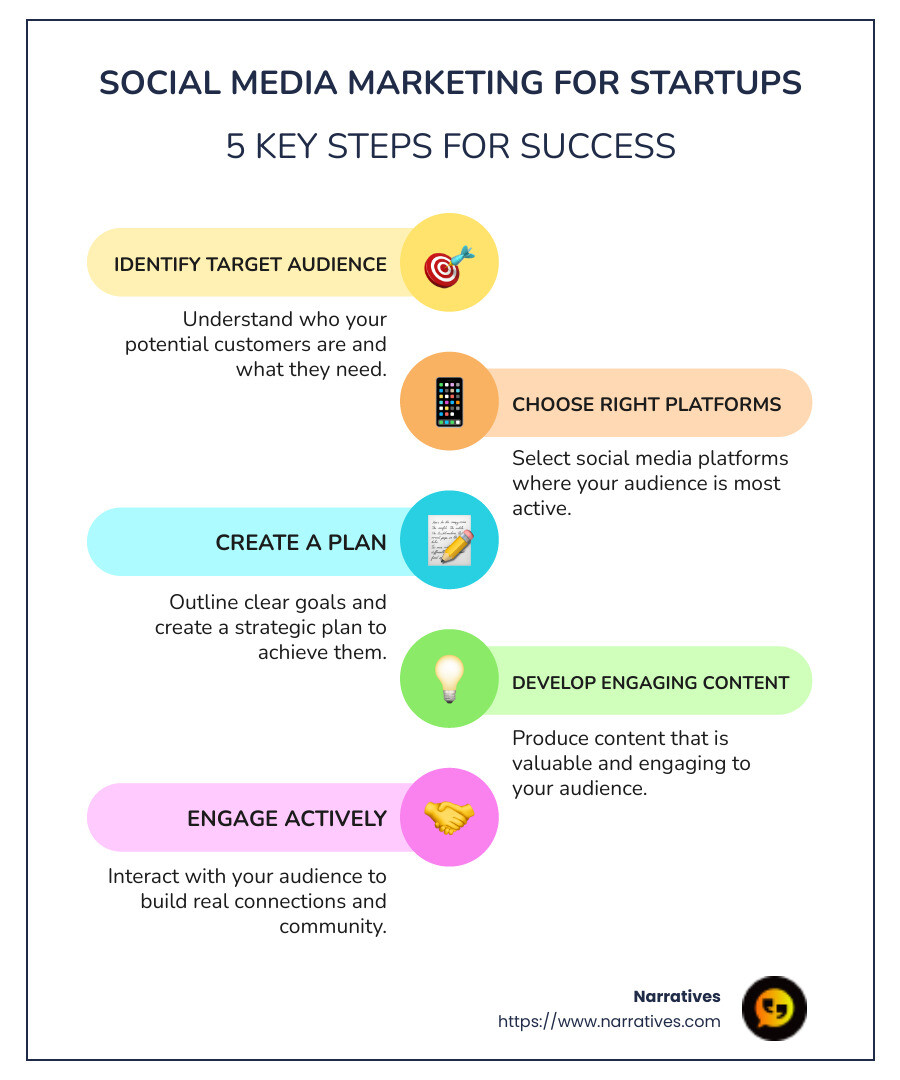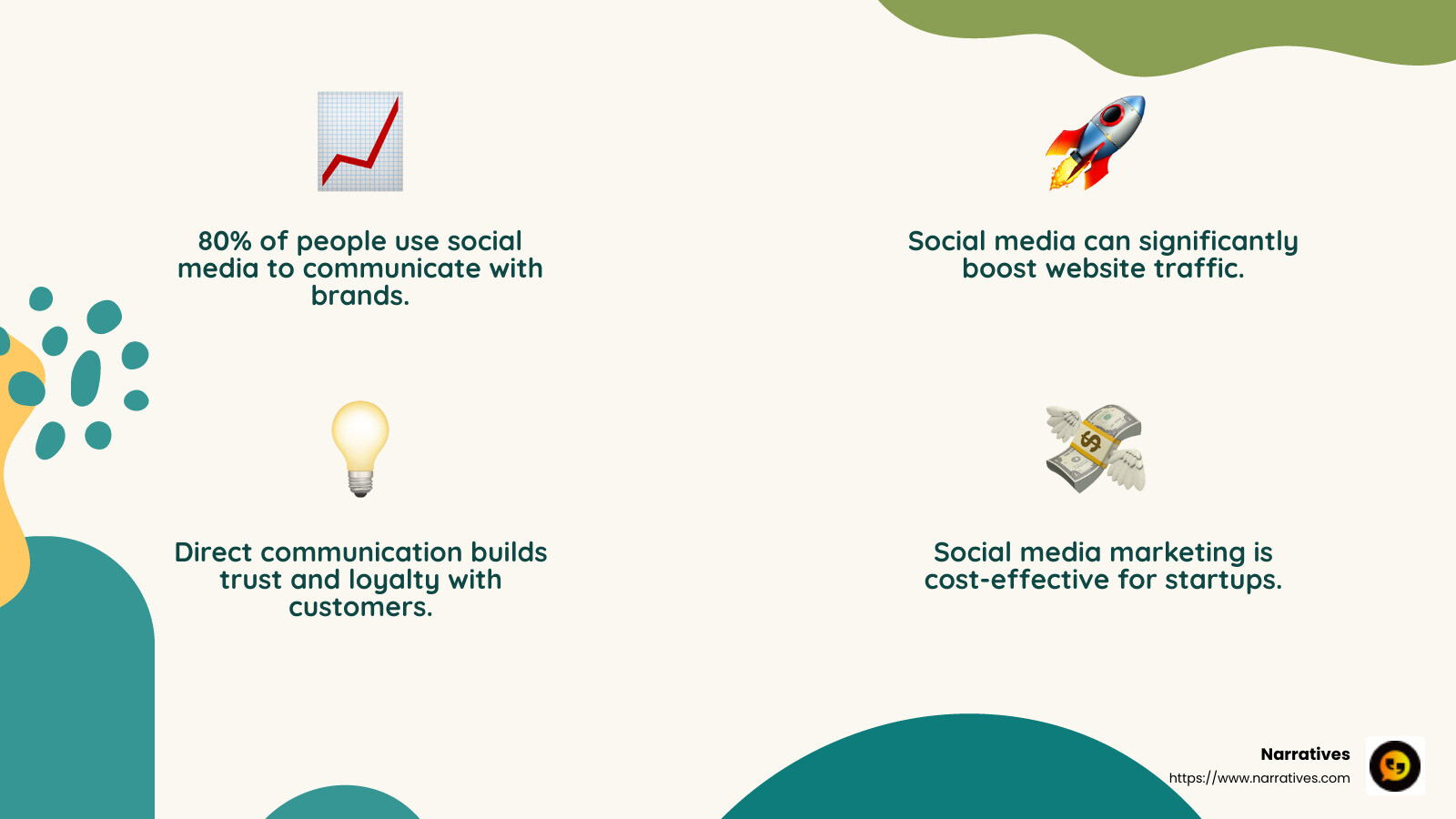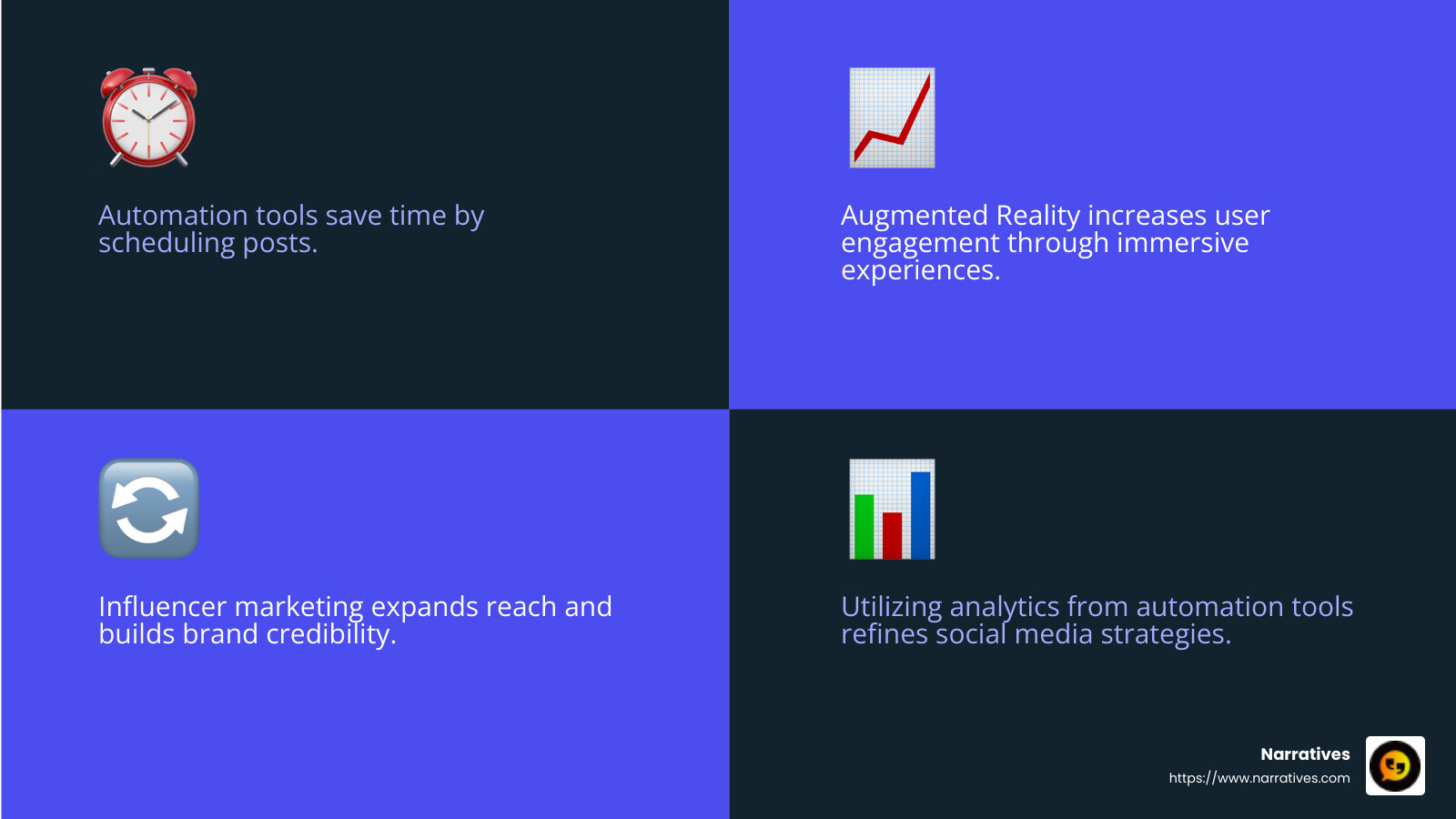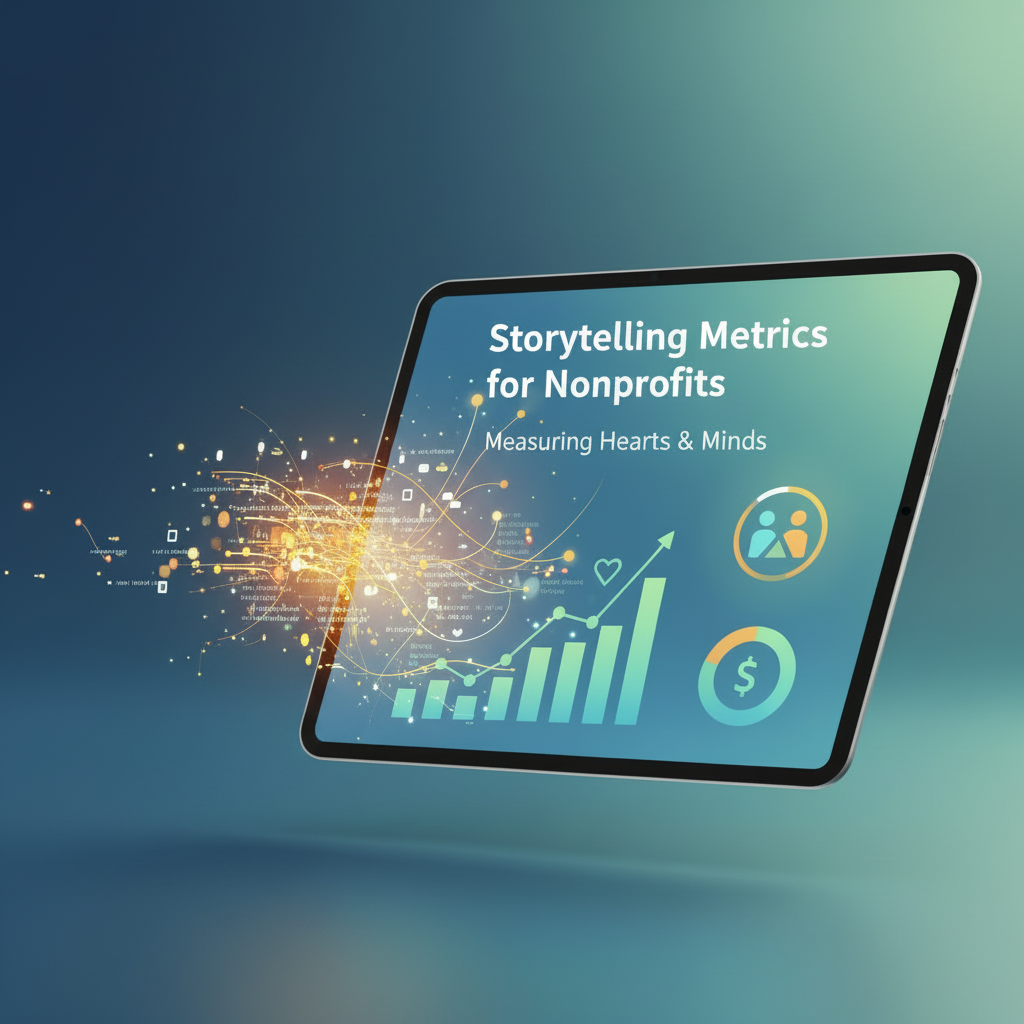Kickstart Your Startup: A How-To on Social Media Marketing

Social media marketing for startups is a game-changer. It's essential for building brand awareness, engaging with potential customers, and driving growth without breaking the bank.
Here's a quick answer for how to get started:
- Identify your target audience: Know who you're talking to.
- Choose the right platform: Be where your audience hangs out.
- Create a plan: Outline your goals and strategies.
- Develop engaging content: Content is king—keep it engaging and valuable.
- Engage actively: Interact with your audience for real connections.
Startups face many challenges, but social media provides a unique opportunity to tell your story and connect directly with your community. With strategic planning, consistent engagement, and valuable content, social media can be the catalyst that transforms a budding startup into a recognized name.

Quick social media marketing for startups terms:
- social media marketing for b2b companies
- social media marketing for music artists
- social media marketing for saas
Understanding Social Media Marketing for Startups
Brand Awareness
For startups, building brand awareness is crucial. Social media platforms offer the perfect stage to introduce your brand to the world. With billions of users across platforms like Facebook, Instagram, and Twitter, you can showcase your products or services to a vast audience. For instance, Under Armour saw a 35% increase in conversion rate with a Facebook ad campaign. This highlights the power of social media in elevating brand visibility.
Direct Communication
Social media breaks down barriers between companies and consumers. It allows for direct communication, making it easier to understand customer needs and preferences. Engaging with your audience through comments, messages, and posts builds trust and loyalty. 80% of people use social media to communicate with brands. This direct line of communication is invaluable for startups looking to make a mark.
High Traffic
Startups can drive significant traffic to their websites or landing pages through social media. Sharing engaging content can lead to increased website visits. For example, Invstr, an investing app, experienced a 2.8X boost in registrations through social media efforts. The key is to create content that resonates with your audience and encourages them to learn more about your offerings.
Low Cost
One of the biggest advantages of social media marketing for startups is its cost-effectiveness. Compared to traditional advertising channels, social media allows for budget-friendly campaigns. You can start with minimal investment and still reach a large audience. Plus, with the use of organic tactics like engaging content and community interaction, startups can achieve significant results without hefty budgets.

By leveraging these aspects of social media marketing, startups can effectively build their brand, engage with customers, and drive growth—all without breaking the bank.
Building a Strong Social Media Presence
To effectively harness the power of social media marketing for startups, a strong social media presence is essential. This involves a strategic approach that includes market research, platform selection, and consistent branding.
Market Research
The first step to building a robust social media presence is understanding your market and target audience. Knowing who your potential customers are and what they are interested in helps tailor your content to meet their needs. Consider metrics like location, demographics, and interests. Investigate who your ideal customers follow and how they interact online. This information shapes your strategy and ensures your content resonates with your audience.
Key Metrics to Consider:
- Location and Demographics: Where are your potential customers based, and what is their age, gender, and income level?
- Interests and Behaviors: What do they like, and how do they spend their time online?
- Competitor Analysis: Who are your competitors, and how are they engaging with their audience?
Platform Selection
Choosing the right platform is critical. Not all social media platforms will be suitable for every startup. Each platform has its own unique audience and style. For instance, Instagram and Pinterest are ideal for visually-driven products, while LinkedIn is more suited for B2B services. According to research, the average person has seven social media accounts, but they tend to favor one or two. Identifying which platform your audience uses most can maximize your reach and engagement.
Platform Tips:
- Facebook: A versatile platform suitable for both products and services.
- Instagram: Best for product-based businesses with strong visual content.
- LinkedIn: Ideal for B2B services and professional networking.
Consistent Branding
Consistency in branding across all platforms is crucial for recognition and trust. Use the same handle, profile picture, and brand voice to create a uniform presence. This consistency helps customers easily recognize and connect with your brand. It's important to maintain a cohesive look and feel, as it reinforces your brand identity and makes your startup more memorable.
Branding Checklist:
- Profile Handles: Use the same handle across all platforms for easy recognition.
- Visuals: Maintain consistent logos, colors, and imagery.
- Voice and Tone: Develop a unique brand voice that resonates with your audience.
By focusing on these foundational elements—market research, platform selection, and consistent branding—startups can build a strong social media presence that supports growth and engagement. This strategic approach not only improves brand visibility but also fosters meaningful connections with your audience, setting the stage for long-term success.
Creating Engaging Content
Creating engaging content is the heart of social media marketing for startups. It involves crafting a content strategy, boosting audience engagement, and ensuring your content is shareable.
Content Strategy
A well-planned content strategy is the backbone of effective social media marketing. Start by defining your goals. Are you looking to increase brand awareness, drive traffic to your website, or generate leads? Once your goals are clear, develop a content calendar to plan your posts in advance. This ensures consistency and helps you stay organized.
Steps to Develop a Content Strategy:
- Identify Your Goals: Determine what you want to achieve with your social media efforts.
- Know Your Audience: Tailor your content to the interests and needs of your target audience.
- Plan Your Content: Use a content calendar to schedule posts and maintain consistency.
Audience Engagement
Engagement is key to building a loyal community around your brand. Encourage your audience to interact with your content by asking questions, hosting polls, or creating contests. Responding to comments and messages promptly also helps build a connection with your followers.
Tips for Boosting Engagement:
- Ask Questions: Encourage interaction by posing questions related to your content.
- Host Contests: Create excitement and encourage sharing by organizing contests or giveaways.
- Be Responsive: Engage with your audience by replying to comments and messages.
Shareable Content
Creating content that people want to share is a powerful way to expand your reach. Shareable content is often relatable, entertaining, or informative. Use eye-catching visuals, compelling headlines, and storytelling to make your posts stand out.
Characteristics of Shareable Content:
- Visual Appeal: Use high-quality images, videos, and graphics to capture attention.
- Relatable Stories: Tell stories that resonate with your audience's experiences and emotions.
- Informative Value: Provide useful information or tips that your audience will find valuable.
By focusing on these elements—content strategy, audience engagement, and shareable content—startups can create a vibrant social media presence. This approach not only attracts new followers but also fosters a community of engaged supporters who are more likely to become loyal customers.
Leveraging Social Media Tools and Trends
In the world of social media marketing for startups, staying ahead means embracing the latest tools and trends. Automation tools, augmented reality, and influencer marketing are essential components that can significantly improve your social media efforts.
Automation Tools
Automation tools are a game-changer for startups with limited resources. These tools help streamline your social media activities, saving time and ensuring consistency. For instance, platforms like SocialPilot allow you to schedule posts across multiple channels, analyze engagement, and even collaborate with your team.
Benefits of Automation Tools:
- Time-saving: Schedule posts in advance to maintain a consistent online presence.
- Efficiency: Manage multiple social media accounts from a single dashboard.
- Analytics: Gain insights into the performance of your posts to refine your strategy.
Augmented Reality (AR)
Augmented reality is revolutionizing the way brands interact with their audience. By integrating AR into your social media strategy, you can create immersive experiences that captivate users. Platforms like Facebook, Instagram, and Snapchat offer AR features that can be used for product demonstrations, virtual try-ons, or interactive ads.
Examples of AR Use:
- Virtual Try-Ons: Allow users to try products virtually, enhancing their shopping experience.
- Interactive Ads: Create engaging ads that users can interact with, increasing engagement rates.
- Story Improvements: Use AR filters to make your stories more engaging and fun.
Influencer Marketing
Influencer marketing is a powerful tool for startups looking to expand their reach and build credibility. Partnering with influencers allows you to tap into their established audience and gain exposure to new potential customers. Choose influencers whose values align with your brand to ensure authenticity.
Steps to Implement Influencer Marketing:
- Identify Relevant Influencers: Look for influencers who resonate with your target audience.
- Build Relationships: Engage with influencers by commenting on their posts and sharing their content.
- Collaborate on Content: Work together to create content that showcases your product in an authentic way.

By leveraging these tools and trends, startups can improve their social media marketing efforts. Automation tools simplify management, augmented reality creates engaging experiences, and influencer marketing expands reach. Embracing these strategies will help your startup thrive in the competitive social media landscape.
Measuring Success and Adapting Strategies
To thrive in social media marketing for startups, measuring success is as important as crafting the strategy itself. Here’s how to do it effectively using KPIs, ROI, and analytics.
Key Performance Indicators (KPIs)
KPIs are the compass that guides your social media efforts. They help you understand whether you're moving in the right direction or need to pivot. Here are some essential KPIs for startups:
- Follower Growth: Track how quickly your audience is expanding.
- Engagement Rate: Measure likes, shares, and comments on your posts.
- Website Traffic: Monitor how much traffic social media is driving to your site.
- Lead Generation: Count the number of leads acquired through social channels.
By setting specific targets for these KPIs, you can clearly see if your efforts are paying off.
Return on Investment (ROI)
ROI is the ultimate measure of success in any marketing campaign. For startups, it’s crucial to compare the cost of your social media activities against the revenue they generate.
- Calculate Costs: Include all expenses related to social media, such as ad spend, tools, and personnel.
- Measure Revenue: Track sales, leads, or any other revenue directly linked to your social media efforts.
If your ROI is positive, it means your efforts are financially beneficial. If not, it’s time to reassess your strategy.
Analytics
Analytics provide a deep dive into how your content is performing and where improvements can be made. Tools like Google Analytics and social media platform insights are invaluable here.
- Audience Insights: Understand who your audience is, including demographics and behavior.
- Content Performance: Identify which posts are most effective and why.
- Trend Analysis: Spot patterns over time to predict future performance.
Using analytics, you can adapt your strategy to focus on what works and discard what doesn’t.
By focusing on KPIs, ROI, and analytics, startups can ensure their social media marketing is both effective and efficient. This data-driven approach allows for continuous improvement and adaptation in a rapidly changing digital landscape.
Frequently Asked Questions about Social Media Marketing for Startups
What are the best platforms for startups?
Choosing the right platform is crucial for any startup's success in social media marketing for startups. Not all platforms are created equal, and each serves different purposes:
Facebook is a versatile platform suitable for both product-based and service-based businesses. With over 2.70 billion monthly active users, it offers a vast audience.
Instagram is ideal for visually-driven content, making it perfect for product showcases.
LinkedIn is the go-to for B2B startups, offering a professional environment for networking and lead generation.
Twitter suits businesses that thrive on real-time updates and engaging conversations.
Pinterest works well for niche markets like fashion, home decor, and DIY crafts.
Startups should focus on the platform where their target audience is most active. This ensures maximum reach and engagement.
How can startups create effective content?
Creating content that resonates with your audience is key to social media marketing for startups. Here's how to do it:
Know Your Audience: Conduct market research to understand your audience's preferences, interests, and pain points.
Content Strategy: Develop a strategy that includes a mix of educational, entertaining, and promotional content.
Engage with Your Audience: Use interactive content like polls, Q&As, and live videos to foster engagement.
Consistency is Key: Post regularly and at optimal times to keep your audience engaged and coming back for more.
Quality Over Quantity: Focus on creating high-quality, valuable content rather than churning out a high volume of posts.
By following these tips, startups can create content that not only captures attention but also builds a loyal following.
Why is social media important for startups?
Social media is a game-changer for startups. Here's why:
Brand Awareness: Social media helps startups build brand recognition quickly and cost-effectively.
Direct Communication: It allows direct interaction with customers, fostering trust and loyalty.
High Traffic, Low Cost: Startups can drive significant traffic to their websites without breaking the bank.
Competitive Edge: With the right strategy, social media can level the playing field, allowing startups to compete with larger companies.
Social media is not just an option but a necessity for startups looking to make an impact.
Conclusion
In social media marketing for startups, the power of storytelling cannot be overstated. At Narratives, we specialize in helping non-profits and purpose-driven organizations harness this power to lift their missions. By crafting compelling, emotionally resonant stories, we enable these organizations to connect deeply with their audiences, inspire action, and amplify their social impact.
Through storytelling, non-profits can effectively communicate their values and achievements. This not only builds trust but also increases visibility in a crowded digital landscape. Our approach focuses on elevating underrepresented voices, showcasing the real-life impact these organizations have on their communities.
Social media offers an unparalleled platform for sharing these stories. With the right strategy, non-profits can transform their social media presence from a simple communication tool into a dynamic storytelling medium. This not only boosts engagement but also fosters a sense of community and shared purpose among supporters.
We believe that storytelling is the key to open uping the full potential of social media for non-profits. By focusing on authentic, impactful narratives, organizations can achieve greater reach and drive meaningful change.
Explore how our digital storytelling services can help your organization make a lasting impact. Find more about our media services here.


